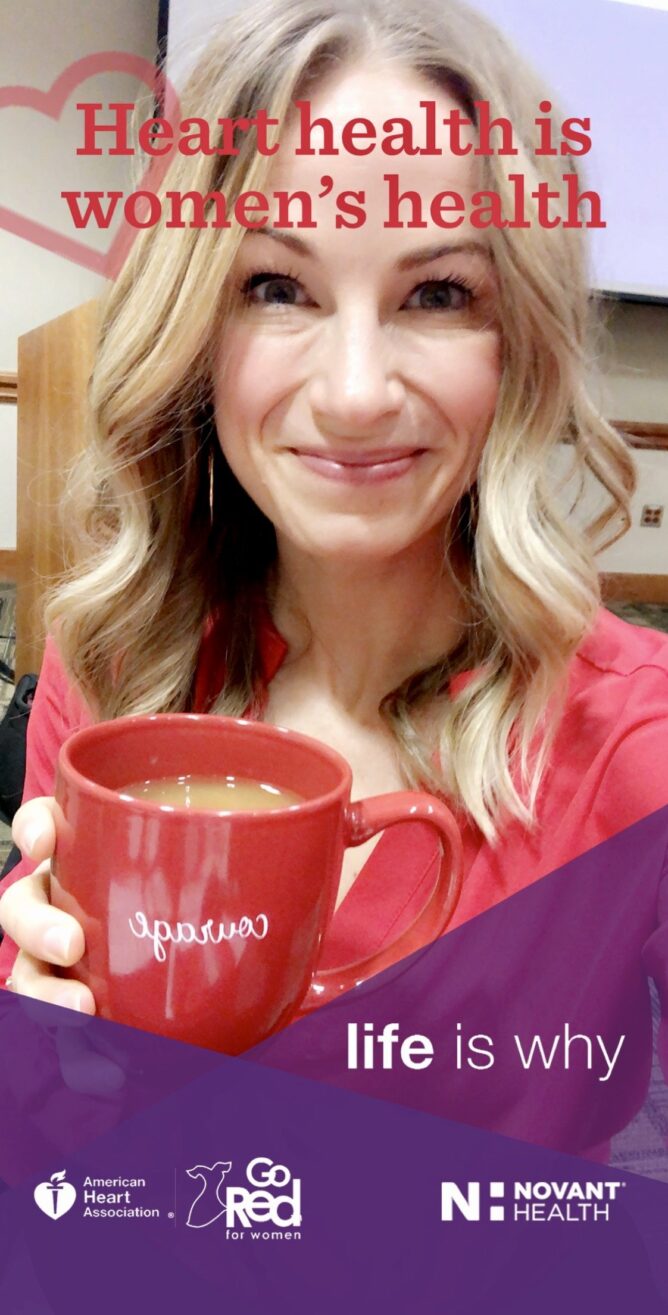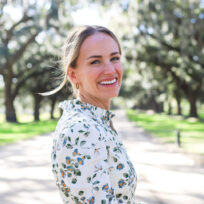


This past Friday, I got to attend the Winston-Salem Goes Red breakfast, in partnership with Novant Health and the American Heart Association. February is National Heart Month and it’s a good reminder to learn and understand the risks of heart disease. I loved how much awareness this event and others brings to our community about the important of heart health. Many organizations in the city light up their buildings in red and there is even a track club event where everyone runs in red dresses to raise awareness. And let’s not forget the Snapchat filter! 🙂
I think there is a common misconception that heart disease happens only to the elderly or out of shape people, but it can impact people of all ages, backgrounds and activity levels. I heard a story at the breakfast about a woman who nearly died from heart disease at age 31; had she not been working at the hospital and received nearly instant treatment, she wouldn’t have survived her heart attack.
Some risk factors are out of your control — like age and family history — but there are some you can control. And the most important thing is to make sure you understand your risk of heart disease.
Knowing your family history of heart disease is especially important since genetics play a big role. When I was in my early 20s and running lots of half marathons, I was diagnosed with high cholesterol (!!). I found it as a result of routine blood work required for my health insurance at Goldman Sachs and was shocked. My total cholesterol was over 200, my good cholesterol was low and my triglycerides were very high. Not a good combo.
After that, I started to learn more about what a healthy diet really means. (Read more about my early journey to health here!) I focused adding in more veggies and reducing red meat and dairy, and I was even vegan for a while. And thankfully, I still get my blood work done every year – all of my jobs in Corporate America have required it and it’s a blessing so I can keep an eye on things. I’m now in my mid-30s and my cholesterol and triglycerides are better than they’ve even been.
While my genetics make me prone to high cholesterol, I can definitely work on my other numbers to help offset that and know my other risk factors. And while I highly doubt most of my you, my fine readers. smoke or are inactive (and if you do smoke or are inactive, you can change that!!!), there are other factors that stood out to me that we may need to think about — particularly alcohol consumption and stress. While I rarely drink these days (more on that in another post, if you’re interested), my stress is THROUGH THE ROOF. (I can also more on that in another post, if you’re interested!)
I honestly didn’t realize that high levels of stress and too little sleep can contribute to heart disease. And I think women in their 20s and 30s especially need to understand how those can impact our heart health. Your heart ages just like your skin and other body parts. (And I can definitely see an impact to my skin when I’m stressed or don’t sleep enough!) With time, cholesterol and other cellular debris accumulate in the artery walls, eventually building up enough to increase the risk for a heart attack and stroke.
In case you need more convincing that you need to take the (free!) assessement and learn your risk, maybe the below will inspire you to take action!
I’d love to hear from you, even though I know this is a personal topic. Do you know your family history? Any risk factors that stand out to you? Leave a comment and share your experience and your goals!
And take the free assessment here: https://nh.team/TeriHealthyHearts
This post was sponsored by Novant Health. A big thank you to them for not only supporting my blog, but also supporting me and my readers in learning more improving our heart health. It’s so easy to focus on external factors – how we look, how many miles we run, etc. – that it’s easy to overlook the stuff we don’t see, but is so so important. We only get one heart!


Leave a Comment
4 responses to “Understanding heart disease in your 20s, 30s and beyond — what you need to know”
Hi Teri, thanks for sharing! This is such an important reminder. I’m 24 with a family history of high cholesterol (which I have already seen reflected in my own blood work) and as a CPA currently in tax season, my sleep in lacking and my stress levels are also THROUGH THE ROOF. I’d definitely be interested in how you manage your stress! Thanks for the reminder to slow down and remember to focus on what is really important, our health!! Have a great friday!
I’d be interested to hear more about alcohol and stress in your life. I keep wondering if alcohol is worth it. It’s not that great, and I seem to have it in social situations out of routine. And stress – would love to hear about that too. You’re so busy, I can’t imagine how you juggle this all.
Hi!! I’d love to see a post on why you rarely drink these days. I am the same way and I’d love to hear your thoughts.
Hi! I really appreciate the way you explained. I agree to the fact that
high blood pressure, diabetes, inactive lifestyle, unhealthy diet, obesity, stress, smoking, alcohol consumption are the factors for heart disease.
Thankyou for sharing this useful information!